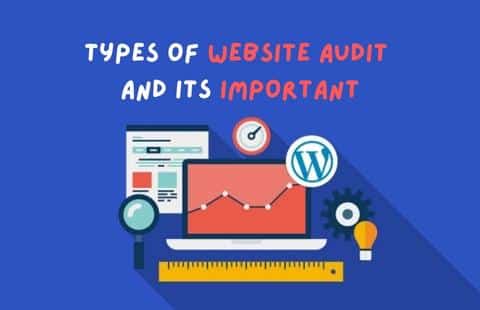- December 27, 2022
- techAdmin
- 0
Website Auditing - Why It is Important and How it works?
A hearty site is the main structure block of a web-based solid standing. According to studies, 75% of customers evaluate a business’s credibility based on its website Auditing. As a result, to provide your audience with a better user experience, you must regularly evaluate your website.
Auditing your website is the most effective method because it enables you to assess its health and performance. It helps close the gaps that affect your conversion rate and end-user experience.
In this blog entry, we will walk you through what a site review is, its sorts, advantages, and boundaries. So, let’s get started!
What Is a Website Auditing?
A website auditing is an in-depth look at a website to ensure it works well, is safe, and gives users a good experience. It helps – Evaluate the website based on factors influencing its visibility in Google’s search rankings.
Conduct a comprehensive analysis of your website. Identify issues that are affecting the website’s performance. Identify areas in your website that need improvement.
Increase user engagement and traffic. Now that you know what they are let’s talk about the various kinds of website audits.
Types of Website Auditing

Every website is unique and faces unique difficulties that must be addressed and resolved. As a result, audits tailored to specific parts of a website come in various forms.
The following are some common types of website auditing:
SEO Checkup: An SEO audit determines how well your website ranks in search engines. An SEO audit looks at keywords, link profiles, traffic behavior, goal conversions, metadata, and other parameters.
Audit of Content: In SEO audits, content is frequently examined. On the other hand, independent content audits make sure that your tone of voice connects with your company. In addition, it identifies the conversion-inducing content.
Audit of Technology: If there is a technical problem, producing high-quality content and keeping up with SEO algorithms won’t help. As a result, inconsistent XML, broken internal links and redirect chains, and other issues are examined in a technical audit.
Design Review: It guarantees that your web compositions are outwardly engaging for an upgraded client experience. It determines whether your website’s content, structure, and colors contribute to an excellent user experience.
Contest Site Review: You need to know what your rivals are doing to ensure your company is unique. Analyzing the websites of your competitors can assist you in developing strategies for improved business performance.
Investigate this blog entry to gain proficiency with the six central critical regions to enhance your website for smoother work processes, better traffic, and higher commitment.
Let’s investigate the top ten essential parameters for a website auditing.
10 Crucial Parameters for a Website Audit
Your website is evaluated using a variety of criteria during auditing. However, the following are the ten most important aspects of a website audit:
Speed of Your Website
The speed of your website influences users’ interactions and actions on your website. Research shows that conversion rates are most affected in the first five seconds of a page’s load time.
Website Responsiveness
A website must be able to adapt to a variety of devices, including smartphones, desktop computers, and tablets. Consequently, Google’s Mobile-Friendly testing tool is one method for determining whether your website adapts to a smaller screen.
User Interface
A user-interface audit examines your website’s UI, navigation, and overall layout.
Security Measures
A web security audit examines your website’s data’s confidentiality, integrity, and security. It involves reviewing security policies, controls, and threats to your website’s IT assets.
Third-Party Plugins and Tools
An audit of the website makes it easier to check how well the website’s third-party plugins and tools are working. In addition, it determines whether your website requires any third-party plugins to improve its functionality. SEMrush, Ahref, Moz, Etc. are the best third-party tools for the website auditing.
Assessment of Platform Upgrades
Content management systems and website hosting platforms like Drupal and WordPress frequently release new versions with additional features. A website audit looks at its platform version, whether it needs to be upgraded, and how scalable it is.
Image Optimization
Having a lot of images on your website can slow it down, which could hurt your SEO ranking. During an image optimization audit, website images are examined for their size, compression, thumbnails, and alt attributes.
Content Advancement
Inspecting the substance of your site incorporates evaluating assets like web journals, greeting pages for significant connections, designated watchwords, and other Search engine optimization measures.
Compliance with ADA/WCAG
Compliance not only makes your website accessible to users with disabilities but also shields your company from legal action. A website audit determines whether your website complies with WCAG and ADA standards.
Database Evaluation
A data evaluation audit identifies any orphaned data while examining your website’s database structure, indexing, and space utilization.
We know that conducting a website audit benefits your business by identifying issues with your website and suggesting solutions.
The following are some additional advantages of conducting a website audit: Enhanced User Experience a website audit helps you fix problems with your website, which makes it load faster, easier to use, and mobile-friendly. Together, these elements improve the user experience, boosting conversion rates.
Site design improvement
Streamlining your site and its substance works on your positioning in Website optimization and draws in rush hour gridlock. You can optimize your website for SERPs and users with a website audit.
Increased Conversion Rates Every marketing manager wants to increase conversion rates and generate leads. You can improve the user experience of your website and, as a result, boost conversion rates with the assistance of a website audit.
Work on the Nature of Content
Content assumes an essential part in client commitment and is likewise an aid for Search engine optimization positioning. A website audit will highlight the steps you need to take to raise the quality of your content, making it easier to engage and convert potential customers.
Keeps Up with Google’s Algorithm Google’s algorithms are constantly changing, so your website needs to keep up. Your website will remain healthy and updated with the most recent algorithms if it is inspected regularly. Your site’s visibility in SERPs will rise as a result.
Now that you know why your company needs a website audit, you probably want to know how often you should do it. Depending on your website size, you should have it checked every year or two years.
Additionally, you must conduct an audit as soon as possible after releasing your website so that any issues can be checked and fixed right away.
Get a Free Audit for a Comprehensive Website Health Check from Zabtech IT Solutions. Our certified web developers will evaluate your website and assist you in identifying areas for improvement.
